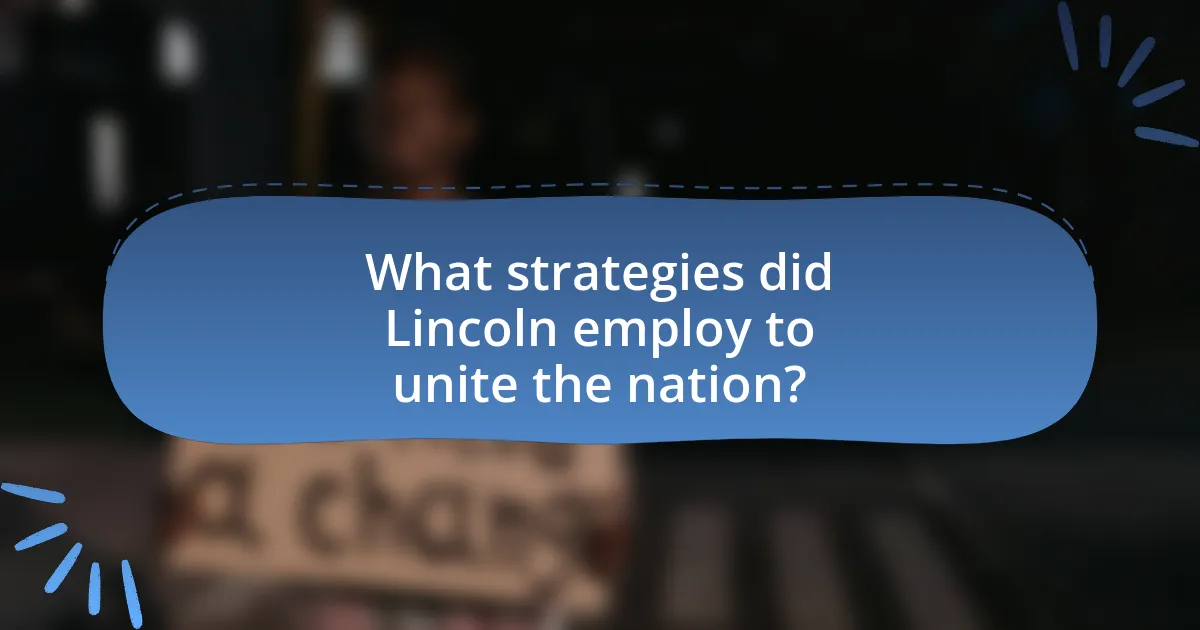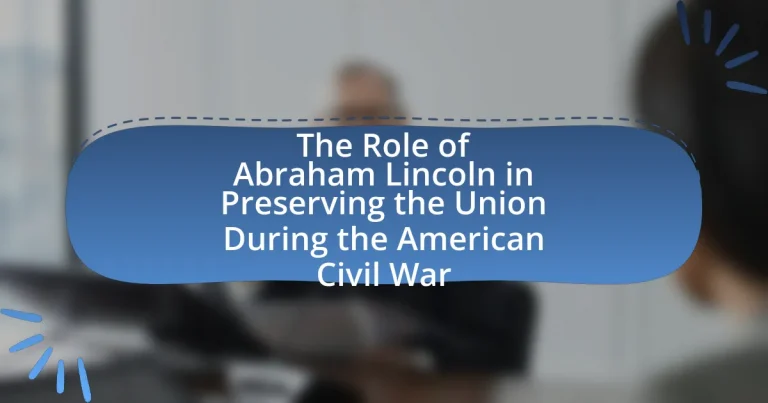Abraham Lincoln served as the President of the United States during the American Civil War from 1861 to 1865, playing a crucial role in preserving the Union and abolishing slavery. His leadership included the issuance of the Emancipation Proclamation, strategic military appointments, and effective communication that rallied public support. Lincoln faced significant challenges, including military opposition and political dissent, yet his decisive actions and vision for national unity ultimately led to the Union’s victory. The article explores Lincoln’s strategies, the impact of his policies on slavery, and the long-term effects of his leadership on post-war America.
What was Abraham Lincoln’s role in the American Civil War?
Abraham Lincoln served as the President of the United States during the American Civil War, leading the nation from 1861 to 1865. His primary role was to preserve the Union and ensure the defeat of the Confederate states, which seceded from the Union. Lincoln’s issuance of the Emancipation Proclamation in 1863, which declared the freedom of all enslaved people in Confederate-held territory, was a strategic move to weaken the Confederacy and bolster Union morale. Additionally, he played a crucial role in the appointment of military leaders, such as Ulysses S. Grant, and in the overall strategy of the war, emphasizing the importance of total war to achieve victory. Lincoln’s leadership was instrumental in guiding the nation through its most challenging period, ultimately leading to the preservation of the Union and the abolition of slavery.
How did Lincoln’s leadership influence the preservation of the Union?
Lincoln’s leadership significantly influenced the preservation of the Union through his commitment to maintaining national unity and his strategic decisions during the Civil War. He emphasized the importance of the Union in his speeches, notably in the Gettysburg Address, where he framed the war as a struggle for a new birth of freedom that would ensure government of the people, by the people, for the people. His issuance of the Emancipation Proclamation in 1863 not only aimed to weaken the Confederacy by freeing enslaved people in rebel states but also redefined the war’s purpose, rallying support for the Union cause. Additionally, Lincoln’s ability to communicate effectively with both military leaders and the public helped to maintain morale and support for the war effort, ultimately leading to the Union’s victory and preservation.
What specific actions did Lincoln take to maintain the Union?
Abraham Lincoln took several specific actions to maintain the Union during the American Civil War, including issuing the Emancipation Proclamation, which aimed to weaken the Confederacy by freeing enslaved people in rebel states. Additionally, he preserved the Union through military strategies, such as appointing effective generals like Ulysses S. Grant and overseeing key battles that turned the tide in favor of the Union. Lincoln also utilized his presidential powers to suspend habeas corpus, allowing for the detention of individuals deemed a threat to national security, which was crucial for maintaining order during the conflict. These actions collectively reinforced the Union’s resolve and contributed to its eventual victory in the war.
How did Lincoln’s speeches reflect his commitment to the Union?
Lincoln’s speeches reflected his commitment to the Union by emphasizing the principles of democracy and national unity. In his Gettysburg Address, he articulated the idea that the Civil War was a test of whether a nation conceived in liberty could endure, reinforcing the importance of preserving the Union. Additionally, in his Second Inaugural Address, he called for reconciliation and healing, stating that both North and South were responsible for the war, which underscored his dedication to restoring the nation. These speeches served as a moral compass, rallying support for the Union cause and highlighting the necessity of maintaining the United States as a single, unified entity.
Why was Lincoln’s presidency critical during the Civil War?
Lincoln’s presidency was critical during the Civil War because he provided decisive leadership that aimed to preserve the Union and abolish slavery. His issuance of the Emancipation Proclamation in 1863 transformed the war’s purpose, making the fight against slavery a central goal and allowing for the enlistment of African American soldiers, which bolstered Union forces. Additionally, Lincoln’s ability to navigate political divisions and maintain support for the war effort was essential; he effectively managed his cabinet and communicated the necessity of the war to the public, ensuring continued commitment to the Union cause. His leadership during pivotal moments, such as the Gettysburg Address, reinforced the moral imperative of the Union’s struggle, solidifying his role as a key figure in American history during this tumultuous period.
What challenges did Lincoln face in his efforts to preserve the Union?
Lincoln faced significant challenges in his efforts to preserve the Union, primarily including military opposition, political dissent, and societal divisions. The military opposition was exemplified by the Confederate Army, which sought to secede from the Union, leading to numerous battles and significant casualties, such as the Battle of Gettysburg in 1863. Politically, Lincoln contended with factions within his own party, including the Radical Republicans who demanded more aggressive measures against the South, and the Peace Democrats who opposed the war altogether. Additionally, societal divisions were stark, as public opinion varied widely, with riots and protests occurring in Northern cities, notably the New York City Draft Riots in 1863. These factors collectively complicated Lincoln’s leadership and decision-making as he navigated the tumultuous landscape of the Civil War.
How did Lincoln’s decisions impact the outcome of the war?
Lincoln’s decisions significantly influenced the outcome of the Civil War by maintaining the Union’s focus on emancipation and military strategy. His issuance of the Emancipation Proclamation in 1863 transformed the war’s purpose, making the abolition of slavery a central goal, which galvanized support from abolitionists and weakened the Confederacy’s labor force. Additionally, Lincoln’s strategic appointments of military leaders, such as Ulysses S. Grant, and his commitment to a total war strategy, including the Siege of Vicksburg and Sherman’s March to the Sea, were pivotal in securing Union victories. These decisions collectively shifted the war’s momentum in favor of the Union, ultimately leading to the Confederacy’s defeat.

What strategies did Lincoln employ to unite the nation?
Abraham Lincoln employed several key strategies to unite the nation during the Civil War, primarily focusing on preserving the Union, promoting emancipation, and fostering national unity through effective communication. Lincoln’s commitment to preserving the Union was evident in his leadership decisions, such as the issuance of the Emancipation Proclamation in 1863, which aimed to weaken the Confederacy while also appealing to anti-slavery sentiments in the North. This strategic move not only aimed to rally support from abolitionists but also sought to undermine the Confederate economy reliant on slave labor.
Additionally, Lincoln utilized effective communication to unify public sentiment, exemplified by his speeches, such as the Gettysburg Address, which emphasized national ideals and the importance of unity. His ability to articulate the moral and political stakes of the war helped to galvanize public support for the Union cause. Furthermore, Lincoln’s willingness to engage with political opponents and include diverse voices in his administration, known as his “Team of Rivals,” fostered a sense of collaboration and shared purpose among different factions within the government.
These strategies collectively contributed to Lincoln’s efforts to unite the nation during a time of profound division, reinforcing his role in preserving the Union amidst the challenges of the Civil War.
How did Lincoln’s policies address the issue of slavery?
Lincoln’s policies addressed the issue of slavery primarily through the Emancipation Proclamation, which declared the freedom of all enslaved people in Confederate-held territory as of January 1, 1863. This executive order aimed to weaken the Confederacy’s war effort by depriving it of labor and also signaled a shift in the Union’s war goals towards the abolition of slavery. Additionally, Lincoln supported the passage of the Thirteenth Amendment, which ultimately abolished slavery in the United States. These actions were pivotal in redefining the Civil War as a struggle not just for the Union, but also for human freedom.
What role did the Emancipation Proclamation play in the war?
The Emancipation Proclamation played a crucial role in the American Civil War by transforming the conflict from a battle for the Union into a fight for freedom. Issued by President Abraham Lincoln on January 1, 1863, the proclamation declared that all enslaved people in Confederate-held territory were to be set free. This strategic move aimed to weaken the Confederacy’s labor force and bolster the Union’s moral cause, thereby gaining support from abolitionists and preventing foreign intervention on behalf of the Confederacy. The proclamation also allowed for the enlistment of African American soldiers into the Union Army, further strengthening its ranks. By the end of the war, approximately 180,000 African American soldiers had served in the Union forces, significantly contributing to the Union’s victory.
How did Lincoln’s views on slavery evolve during his presidency?
Abraham Lincoln’s views on slavery evolved significantly during his presidency, shifting from a focus on preventing its expansion to advocating for its abolition. Initially, Lincoln aimed to preserve the Union and believed that stopping the spread of slavery into new territories was essential for national unity, as articulated in his 1861 inaugural address. However, as the Civil War progressed, he recognized that emancipation was crucial for weakening the Confederacy and gaining moral high ground. This culminated in the issuance of the Emancipation Proclamation on January 1, 1863, which declared the freedom of all enslaved people in Confederate-held territory, marking a decisive shift towards abolition. Lincoln’s evolution was further solidified by his support for the Thirteenth Amendment, which abolished slavery entirely, reflecting his commitment to ending the institution as a means to preserve the Union.
What diplomatic efforts did Lincoln undertake to secure support?
Abraham Lincoln undertook several diplomatic efforts to secure support for the Union during the Civil War. He focused on maintaining relationships with foreign powers, particularly Britain and France, to prevent them from recognizing the Confederacy. Lincoln’s administration emphasized the importance of the Union’s moral stance against slavery, which appealed to anti-slavery sentiments in Europe. Additionally, he sent diplomats like Charles Francis Adams to Britain to counteract Confederate propaganda and to ensure that British support remained with the Union. The successful outcome of these efforts was evident when Britain refrained from formally recognizing the Confederacy, which was crucial for the Union’s survival.
How did Lincoln manage relationships with border states?
Abraham Lincoln managed relationships with border states by employing a combination of political strategy, military presence, and careful communication. He recognized the strategic importance of border states like Kentucky, Missouri, Maryland, and Delaware, which were slave states that had not seceded. To maintain their loyalty, Lincoln avoided immediate abolitionist rhetoric and instead focused on preserving the Union, emphasizing that the war was about maintaining national unity rather than ending slavery.
Lincoln also used federal resources to support loyalist factions within these states, ensuring that they remained aligned with the Union cause. For example, he sent troops to protect key locations and prevent Confederate sympathizers from gaining influence. His administration also offered incentives, such as financial aid and military support, to encourage border states to remain loyal. This approach was crucial in preventing the secession of these states, which would have significantly weakened the Union’s position during the Civil War.
What was the significance of foreign relations during the Civil War?
Foreign relations during the Civil War were significant as they influenced the Confederacy’s ability to secure international recognition and support, which was crucial for its survival. The Confederacy sought to gain recognition from European powers, particularly Britain and France, to bolster its legitimacy and secure military and economic assistance. However, the Union’s diplomatic efforts, led by figures such as Secretary of State William H. Seward, successfully prevented this recognition by emphasizing the moral implications of slavery and the Union’s commitment to preserving democracy. The failure of the Confederacy to gain foreign support was evident when Britain, despite its reliance on Southern cotton, ultimately chose to remain neutral, influenced by the Union’s diplomatic strategies and the changing public sentiment regarding slavery. This lack of foreign support significantly weakened the Confederacy’s position and contributed to its eventual defeat.
What were the long-term effects of Lincoln’s actions on the Union?
Lincoln’s actions had profound long-term effects on the Union, primarily solidifying its preservation and shaping its future governance. His issuance of the Emancipation Proclamation in 1863 not only aimed to weaken the Confederacy but also laid the groundwork for the eventual abolition of slavery, fundamentally altering the social and economic landscape of the nation. The passage of the 13th Amendment in 1865, which abolished slavery, was a direct result of Lincoln’s leadership and vision for a united nation free from the institution of slavery. Furthermore, Lincoln’s commitment to a strong federal government established a precedent for federal authority over states, influencing the balance of power in American governance. His actions fostered a sense of national identity and unity that persisted long after the Civil War, ultimately contributing to the United States’ emergence as a global power in the following decades.
How did Lincoln’s leadership shape post-war America?
Lincoln’s leadership significantly shaped post-war America by promoting national unity and the principles of freedom and equality. His commitment to preserving the Union during the Civil War laid the groundwork for a more centralized federal government and the eventual passage of the 13th Amendment, which abolished slavery. This amendment, ratified in December 1865, marked a pivotal shift in American society, ensuring that the ideals of liberty and justice were extended to formerly enslaved individuals. Additionally, Lincoln’s vision for Reconstruction emphasized reconciliation rather than punishment, influencing policies that aimed to integrate the Southern states back into the Union while protecting the rights of newly freed citizens. His assassination in April 1865 further intensified the national discourse on civil rights and the responsibilities of citizenship, shaping the trajectory of American democracy in the years that followed.
What were the implications of Lincoln’s assassination for the nation?
Lincoln’s assassination had profound implications for the nation, leading to increased political instability and a shift in leadership during a critical period of Reconstruction. His death on April 14, 1865, created a power vacuum that intensified divisions between various factions, particularly between those advocating for leniency towards the South and those pushing for harsher measures. This tension contributed to the eventual impeachment of President Andrew Johnson, who succeeded Lincoln and struggled to implement policies that aligned with Lincoln’s vision for reunification. Additionally, Lincoln’s assassination fueled resentment in the South and heightened tensions between North and South, complicating efforts to heal the nation after the Civil War. The absence of Lincoln’s leadership and vision for reconciliation ultimately delayed the process of national healing and contributed to the long-lasting effects of racial and regional strife in the United States.
How did Lincoln’s vision for Reconstruction influence future policies?
Lincoln’s vision for Reconstruction, which emphasized reconciliation and leniency towards the South, significantly influenced future policies by establishing a framework for integrating formerly Confederate states back into the Union. His approach, articulated in the Ten Percent Plan, aimed to facilitate a swift restoration of the Union by allowing states to rejoin once 10% of their voters pledged allegiance to the Union. This lenient stance set a precedent for subsequent policies, such as the moderate Reconstruction efforts of Presidents Andrew Johnson and Ulysses S. Grant, which continued to prioritize rapid reintegration over punitive measures. Lincoln’s vision also laid the groundwork for future debates on civil rights and federal authority in the South, influencing the eventual passage of the 13th, 14th, and 15th Amendments, which aimed to secure rights for freed slaves and reshape the political landscape in America.
What lessons can be learned from Lincoln’s approach to leadership?
Lincoln’s approach to leadership teaches the importance of empathy, strategic communication, and inclusivity in decision-making. He demonstrated empathy by understanding the diverse perspectives of both Union and Confederate citizens, which helped him navigate the complexities of the Civil War. His strategic communication, exemplified by the Gettysburg Address, effectively conveyed his vision for the nation and rallied public support. Additionally, Lincoln’s inclusivity in assembling a diverse cabinet, known as the “Team of Rivals,” showcased his belief in leveraging differing viewpoints to strengthen governance. These elements of his leadership contributed significantly to preserving the Union during a tumultuous period in American history.
How can Lincoln’s strategies be applied to modern leadership challenges?
Lincoln’s strategies can be applied to modern leadership challenges by emphasizing empathy, effective communication, and coalition-building. His ability to connect with diverse groups and understand differing perspectives allowed him to unite a fractured nation during the Civil War. For instance, Lincoln’s use of the Emancipation Proclamation not only aimed to free enslaved individuals but also strategically weakened the Confederacy while rallying support from abolitionists in the North. This demonstrates that modern leaders can benefit from understanding the broader implications of their decisions and fostering inclusive dialogue to address complex issues. Furthermore, Lincoln’s practice of surrounding himself with a “team of rivals” illustrates the importance of diverse viewpoints in decision-making, which remains relevant for contemporary leaders facing multifaceted challenges.
What qualities made Lincoln an effective leader during a crisis?
Abraham Lincoln’s effectiveness as a leader during a crisis stemmed from his strong communication skills, emotional intelligence, and decisiveness. His ability to articulate the values of the Union and the necessity of preserving it helped unify the nation during the Civil War. Lincoln’s emotional intelligence allowed him to empathize with the struggles of both soldiers and civilians, fostering a sense of shared purpose. Additionally, his decisiveness was evident in critical moments, such as the issuance of the Emancipation Proclamation in 1863, which not only aimed to weaken the Confederacy but also reframed the war as a fight for freedom. These qualities, combined with his strategic vision and willingness to adapt to changing circumstances, solidified his role as a pivotal leader during one of America’s most challenging periods.


